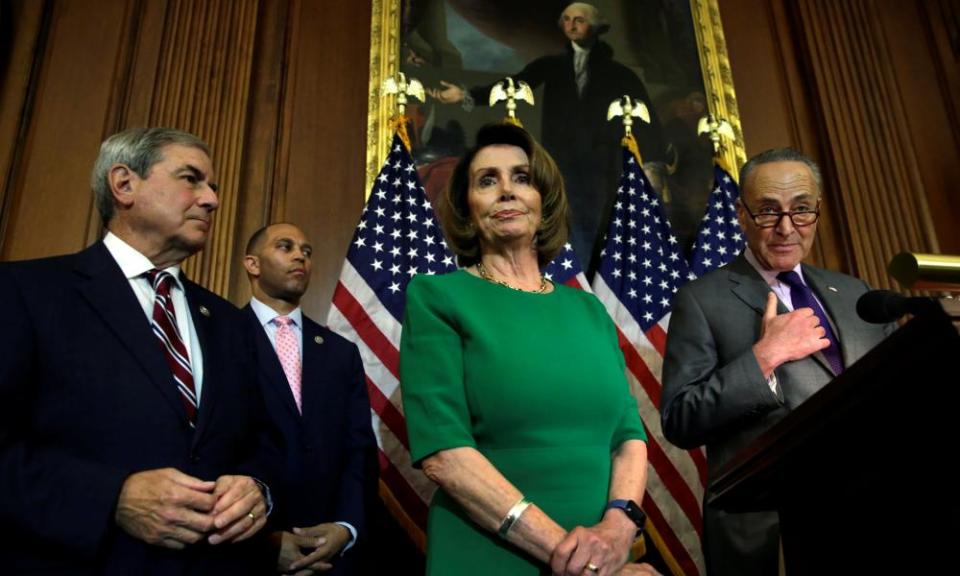Congress averts a government shutdown hours before deadline
House and Senate approve stopgap spending measure while negotiators work to reach an agreement over a longer-term funding package

Hours before a midnight deadline, Congress averted a government shutdown – at least for now – ensuring that the lights will stay on in Washington as Donald Trump marks his 100th day in office.
But the feat comes with a trade-off. Republicans failed to secure enough votes to advance their healthcare replacement plan despite pressure from the White House to hold a vote on the bill before the symbolic 100-day mark.
The House of Representatives approved a stopgap spending measure on Friday by a vote of 382 to 30 while negotiators worked to reach an agreement over a longer-term funding package – a deal congressional leaders from both parties say is nearly finalized. The Senate unanimously approved the measure less than a hour later.
The prospect of a shutdown faded earlier this week after Trump softened his demands for money to build a wall along the south-western border and backed off a threat to cease payments for a critical piece of the federal healthcare law, both “non-starters” for Democrats.
But in a twist on Thursday, Democrats threatened to oppose the short-term spending measure if Republicans succeeded in their an eleventh-hour push to hold a vote on healthcare by the end of the week.
House Republican leaders worked late into the night on Thursday trying to convince wary moderates to support the revised healthcare bill. Ultimately, they came up short. Emerging from a closed-door meeting on Thursday night, the House majority leader, Kevin McCarthy, told reporters: “We are not voting on healthcare this week.”
The House speaker, Paul Ryan, tried to downplay the likelihood that the bill would come up for a vote before the end of the week, telling reporters on Thursday morning: “We’re going to go when we have the votes.” Throughout the day, a handful of centrist and moderate Republicans either came out against or expressed a reluctance to support the legislation.
Their failure to deliver for the president on healthcare, however, paved the way for lawmakers to keep the government running. Minority whip Steny Hoyer, a Maryland Democrat, said on Thursday that he would oppose the stopgap funding plan – and threaten a shutdown – if Republicans brought the healthcare bill up for a vote before the end of the week.
The House minority leader, Nancy Pelosi, described Republicans’ healthcare predicament a “lose-lose-lose situation”. “The minute they cast that vote, they put doo‑doo on their shoe, tattoo on their forehead,” Pelosi said, referring to the healthcare bill.
For seven years, Republicans promised to repeal and replace the Affordable Care Act. And as a candidate, Trump promised to repeal Obamacare “on day one”. But Republicans’ failure to craft legislation that wins support from enough members of their own party is evidence of just how tricky it will be to dismantle the 2010 healthcare law.
Republicans’ first attempt to pass repeal legislation drew fierce criticism from moderates and conservatives. An analysis by the Congressional Budget Office estimated that under the plan 24 million Americans would lose health insurance.
The new version would allow states to obtain exemptions from certain Obamacare insurance rules, including a requirement that plans cover benefits such as maternity care, mental healthcare and prescription drugs. Protections for individuals with pre-existing conditions would also be at risk under the amendment, with the potential for insurers to charge more for certain enrollees with pre-existing conditions, or those who are older.
The bill has won support from the Freedom Caucus, the group of arch-conservatives who were instrumental in sinking the first effort. But now it’s moderates who Republicans are failing to bring onboard.
The government was due to run out of money at midnight on Friday. A bipartisan team of negotiators are working on a package that would fund the government through the end of the fiscal year, on 3o September.
The trillion-dollar budget proposal is expected to include increased funding for border security and defense spending with the understanding that the money is not for the construction of Trump’s wall.

